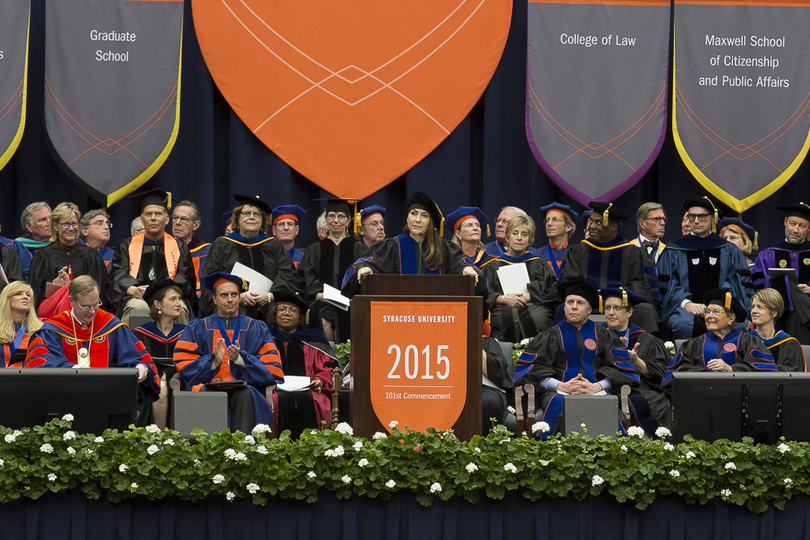Mary Karr uses personal experiences to offer graduates advice in commencement speech
In her address to the Class of 2015 at the commencement ceremony for Syracuse University and SUNY-ESF, award-winning poet Mary Karr talked about fear.
Karr, who is also a professor of English at SU, said poetry works by starting in a scared place and zip-lining somewhere truer.
“It’s stripping away what’s false so you can see what’s true underneath,” Karr said. “I like to say poetry has to disturb the comfortable and comfort the disturbed.”
Karr delivered the commencement address to a crowd of graduates and their families as well as faculty and administrators in the Carrier Dome Sunday. In her speech, she reflected on her life and offered advice to graduates about what might await them in the next phase of their lives.
As a tribute to the mothers in attendance on Mother’s Day, Karr read a poem she wrote about her son reaching the age of 16 and driving away in her car, only to crash it and later be driven home by a police officer.
Karr then spoke about how each person graduating has contributed something “to the conversation this city runs on.”
“Each of you is a spark that’s added something to our little flame. And I’m not just talking to the A-makers, to the valedictorians, the salutatorians; I’m addressing the squeakers,” Karr said. “I hope you all learned what you came here for and what you didn’t.
“So on this day of celebration and hope, I want to do the poet’s glum-bunny thing of bringing up that deep, soul-destroying fear and suffering that plague every human life. And I want to pass on a few tricks I’ve learned in such times for I am an expert in fear.”
Karr spoke about her life growing up in the swampy corner of east Texas. In her mid-teens, she moved to California with her six drug-dealing friends. Four ended up in jail, two died at 20, one was diagnosed as HIV positive and another went into the witness protection program, she said.
“What turned me to drugs, I believe, was partly a genetic gift from my family,” Karr said. “I’m Irish and Native American, but I also grew up in a chaotic household where everybody was opinionated and, because it was Texas, well-armed.”
Karr said although her father had a gambling problem and her mother had mental and drug problems, she loved and learned from them both. She added that pretty much every literary project she had worked on in the past 40 years has been derived from what her parents have taught her.
Karr posed the question if being her parents’ daughter was good for her or bad for her and resolved that she wouldn’t have it any other way.
When Karr started her academic career, she had checked herself in to a mental institution for suicidal ideation and was under custodial care. In order to attend one of her first events, she had to get a day pass.
She added that she spent the whole day holding her wrist in fear that someone might spy the bracelet, which marked her as a mental patient.
“But that stay in the Mental Marriot — as I called it — wasn’t the end of my life, it was the beginning,” Karr said. “It’s where I finally heard enough to ask for help. It’s where I learned that as deep as a wound is, that’s how deep the healing can be.”
Karr addressed the more than 6,000 graduates seated in the Carrier Dome and told them that bad things were going to happen to them. She added that worrying about these bad things wouldn’t help prevent them either.
“Don’t make the mistake of comparing your twisted up insides with other people’s blow-dried outsides,” Karr said.
Karr concluded her speech with one last story about how one of her professors at Macalester College, Walt Mink, inspired her to teach at a college level.
When Karr had Mink as a professor, she said she was paired with “the most irritating lab partner in history.” At one point, Karr asked her professor why he didn’t tell her lab partner to shut up.
Her professor’s response was one Karr would never forget: “‘Because it’s my job to put information into his head and unless I know what’s already in there, I can’t do my job.’”
Karr’s professor also often took Karr to lunch at restaurants and before Karr left Minnesota she asked her professor how she was going to pay him back for all of the meals. He told her that she wasn’t going to pay him back; she was going to buy someone else lunch.
“Walt showed me that a talent for fear could also mask a talent for empathy, for caring about what other people thought,” Karr said. “Now y’all go out there and buy somebody broker than you lunch.”
Published on May 10, 2015 at 3:55 pm
Contact Sara: smswann@syr.edu | @saramswann








